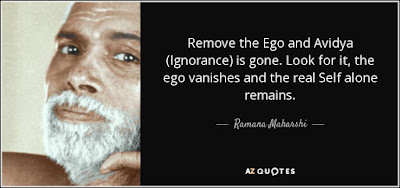The energy of Divine love is a specific insight found throughout the Bhagavad Gita. The Divine Self (atma) vibrating throughout the universe is the Divine Master who loves us all equally. Every human person has the ability to hear from within the Divine depth of his/her being: "You are dear to me, I long for you, you are my beloved and my friend" (Gita 18:64, 65 – 4:3). This is not a God speaking from outside, but from within the very heart of reality. The relation with this “inside” God is not just at the mental level of I-thou structure, but within a mystical consciousness of mutual indwelling: "I am in you, you are in me" (9:29)…The true bhakta experiences the Lord as the inner subject (10:8), the true jnani perceives the Divine as one's deeper self (7:18).
With these perceptions then, human life may become a direct response to the Divine love permeating the entire universe and filling one's heart. Every bit of reality communicates the vibration of the contagious power of Divine kama (7:11). One finds themselves and all beings on this eternal journey of Divine love. One feels called to a life of compassion towards all beings, human and cosmic, animate and inanimate. "My true devotee does not feel hatred for any being, but is friendly and compassionate towards all, without the thoughts of I-and-mine" (12:13). Thus the basic trait of a liberated person is compassion.
Compassion takes inner freedom for granted: freedom from any possessive feelings of I-and-mine. Inner freedom makes a person remain calm through all changes encountered in life: in success and failure, in gain and loss, in honor and disgrace, towards friend and enemy, saints and sinners, relatives and strangers (2:38 – 6:9 – 12:18 – 13:10). A person of inner peace is not easily thrown off-balance by conflicting emotions of fear and fascination, anger and attachment, joy and suffering (2:56 – 5:20).
A compassionate person is not a dispassionate being. Sharing one's life (and possessions) with those in need is the basis of compassion. "The one who cooks food only for oneself, eats poison." (3:13). A passionate concern (rati, 5:25) to bring about welfare to all beings characterizes the life of liberated person. Intense attraction (chikeershu, 3:25) to assisting in the integration of the world is the motivation of his/her commitment. Compassion is the total surrender of a person to the “cause of the other” within the environment of Divine creativity.
Compassion demands an effective appraisal of the dehumanizing behavioral patterns and the oppressive structures of society. The Gita raises an uncompromising protest against discriminative social traditions, exploitative economic systems, aggressive political structures and dehumanizing religious practices (5:18 – 16:13-19 – 2:42-44). A compassionate person is a courageous person because his being is firmly established in the consciousness of the Divine (2:56 – 6:14).

Compassion enables a person realize their creativity. The one who acts from the motivation of the ego (ahamkara) has to compete with others in a compulsive way, because their actions are controlled by greed, anger, lust and hate (2:62-63 – 3:25). The one who acts, rooted in the Divine ground of being realizes that the Divine Master is the real subject of one's actions (13:3). "Ascribing all works to the Divine, one acts with inner freedom." (5:10). With this spiritual realization one naturally becomes more creative, more courageous and more compassionate.
Compassion is not simply a virtue to practice, but a holistic attitude that binds every person to everything with the bond of Divine love. One sees “reflections of the Self everywhere” (6:32) because one realizes that one's Self is the Self of all (sarvabhutatma bhutatma, 5:7). All things are bound together on the Divine chord of life and love (7:7). No being can be alien and no one a stranger to a truly realized person. With all the “things” of nature, we humans all live in the one family of the Divine. There is no room for competition, but only the capacity for compassion. "Mutually nourishing one another we all attain real prosperity" (3:11). Such an integral world-view can be very healthy today, when humanity cuts itself apart through competitiveness, threatening to destroy the cosmic matrix of life.
Rae Indigo is ERYT 500

